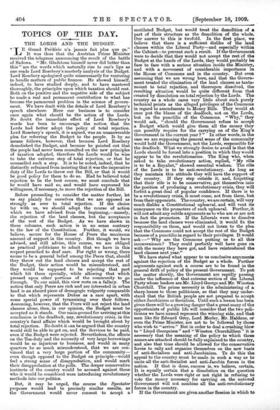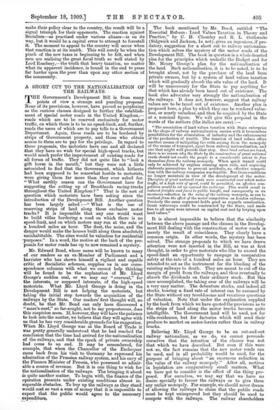TOPICS OF THE DAY.
THE LORDS AND THE BUDGET.
E Grand Frederic n'a jamais fait plus que ca."
I It was thus that the Austrian Prime Minister received the telegram announcing the result of the battle of Sadowa. " Mr. Gladstone himself never did better than this " are the words which naturally rise to one's lips as one reads Lord Rosebery's masterly analysis of the Budget. Lord Rosebery apologised quite unnecessarily for venturing to handle matters of public finance. He showed himself, indeed, to have studied deeply, and to have mastered thoroughly, the principles upon which taxation should rest. Both on the positive and the negative side of the subject he made a real and permanent contribution to what has become the paramount problem in the science of govern- ment. We have dealt with the details of Lord Rosebery's speech elsewhere. Here our business is to consider once again what should be the action of the Lords. No doubt the immediate effect of Lord Rosebery's words has been to encourage the notion that the Lords had better adopt the policy of total rejection. Lord Rosebery's speech, it is argued, was an unanswerable plea for referring the Budget to the people. It by no means follows, however, that because Lord Rosebery demolished the Budget, and because he pointed out that the people had never been consulted on the new principles of taxation adopted, therefore the Lords would be wise to take the extreme step of total rejection, or that he counselled such a step. It is to be noted, indeed, that he distinctly refrained from insisting that it was the imperative duty of the Lords to throw out the Bill, or that it would be good policy for them to do so. Had he believed total rejection to be the best course, we must conclude that he would have said so, and would have expressed his willingness, if necessary, to move the rejection of the Bill.
Before proceeding to consider the matter further, let us say plainly for ourselves that we are opposed as strongly as ever to total rejection. If the choice lay with us, we should adopt the course of action which we have advised from the beginning,—namely, the rejection of the land clauses, but the acceptance of the rest of the Budget. As we have shown in these columns, such action is in no sense contrary to the law of the Constitution. Further, it would, we believe, secure for the House of Peers the maximum amount of support in the country. But though we have advised, and still advise, this course, we are obliged as practical politicians to admit that we have in this respect preached to deaf ears. For right or wrong, there seems to be a general belief among the Peers that, should they throw out the land clauses and accept the rest of the Budget, their action would be misunderstood, and they would be supposed to be rejecting that part which hit them specially, while allowing that which pressed upon other portions of the community to go through. To our mind, this view rests on a fallacy. The notion that only Peers are rich and are interested in urban land is an absurd piece of demagogic vulgarity comparable to that which represents Dukes as a race apart, with some special power of tyrannising over their fellows. Assuming, however, that the Peers will not reject the land clauses alone, then, in our opinion, the Budget must be accepted as it stands. Our main ground for arriving at this conclusion is the deadlock, nay, revolutionary crisis, in the country's fiscal affairs which would be brought about by total rejection. No doubt it can be argued that the country would still be able to get on, and the Services to be paid, even if the Budget were rejected. Nevertheless, the effects on the Tea-duty and the necessity of very large borrowings would be so injurious to business, and would in many quarters be so much misunderstood, that we are con- vinced that a very large portion of the community— even though opposed to the Budget on principle—would feel a strong sense of disapprobation, and would mark their disapprobation at the polls. The deeper conservative instincts of the country would be aroused against those who it would be considered were introducing revolutionary methods into our politics.
But, it may be urged, the course the Spectator proposes would lead to precisely similar results, as the Government would never consent to accept a mutilated Budget, but would treat the demolition of a part of their structure as the demolition of the whole. Our answer to this is twofold. In the first place, we believe that there is a sufficient dislike of the land. clauses within the Liberal Party—and especially within the Cabinet—to prevent such a result. If the Government were to decide that they would not accept the rest of the Budget. at the hands of the Lords, they would probably be face to face with a serious situation inside the Ministry, and with a movement of considerable importance in the House of Commons and in the country. But even assuming that we are wrong here, and that the Govern- ment treated the elimination of the land clauses as tanta- mount to total rejection, and thereupon dissolved, the resulting situation would be quite different from that created by dissolution on total rejection by the Lords. The country as a whole cares very little about such purely technical points as the alleged privileges of the Commons in regard to amendments to Money Bills. They would at once put the blame of the deadlock, not on the Lords, but on the punctilio of the Commons. " Why," they would ask, " should the Government refuse to accept a Budget which would give them all the money they can possibly require for the carrying on of the King's Government in the current year ? " In other words, in the case we are supposing the general sense of the community would hold the Government, not the Lords, responsible for the deadlock. What we strongly desire to avoid is that the Lords should be forced into a position in which they would appear to be the revolutionaries. The King who, when asked to take revolutionary action, replied, " My role is to be a Royalist," showed essential wisdom. The role of the Lords is to be anti-revolutionary. As long as they maintain this attitude they will have the support of the country. If they step outside it, and, forgetting that their role is to be conservative, get themselves into the position of producing a revolutionary crisis, they will forfeit a great deal of popular confidence. If there is to be a revolutionary crisis, it must come, not from them, but from their opponents. The country, we are certain, will very much dislike a Constitutional upheaval, and will vent its annoyance on the promoters of such upheaval. Further, it will not admit any subtle arguments as to who are or are not in fact the promoters. If the Liberals were to dissolve because the land clauses were eliminated, it would fix the responsibility on them, and would not listen to the plea that the Commons could not accept the rest of the Budget because of a punctilio in regard to their privileges. It would ask :—" Why are the Commons putting us to all this inconvenience ? They could perfectly well have gone on with the money they have got, and have reintroduced the land clauses next year."
We have stated what appear to us conclusive arguments against the rejection of the Budget as a whole. Further arguments against such a course are to be found in the general drift of policy of the present Government. To put the matter shortly, the Government are rapidly passing under the influence of that extreme section of the Liberal Party whose leaders are Mr. Lloyd George and Mr. Winston Churchill. The prime necessity is the administering of a sharp lesson to those politicians, so that they may under- stand that the British people are not prepared to accept either Jacobinism or Socialism. Until such a lesson has been given there will be a growing danger that a great many of the opportunists of public life will consider that the two poli- ticians we have named represent the winning side, and that men like Sir Edward Grey, Lord Morley, Mr. Haldane, or even the Prime Minister, are not to be followed by those who wish to " arrive." But in order to deal a crushing blow to " Lloyd Georgeism " and " Winston Churchillism " it is necessary that the mewing of the policy to which these names are attached should be fully explained to the country, and also that time should be allowed for the conservative forces to rally and organise themselves on the new basis of anti-Socialism and anti-Jacobinism. To do this the appeal to the country must be made in such a way as to unite all the anti-Socialist and anti-Jacobin forces in the nation. If that is done, success is, we believe, certain. It is equally certain that a dissolution on the question whether the Lords were right or not right in refusing to vote the money necessary for carrying on the national Government will not combine all the anti-revolutionary forces in the country.
If the Government are given another Session in which to make their policy clear to the country, the result will be a signal triumph for their opponents. The reaction against 'Socialism—as practised under various aliases—is on its way, but it would be a capital error to attempt to forestall it. The moment to appeal to the country will occur when that reaction is at its zenith. This will surely be when the pinch of the new taxes is beginning to be felt, and when men are realising the great fiscal truth so well stated by Lord Rosebery,—the truth that heavy taxation, no matter what its apparent incidence, is bound in the end to press far harder upon the poor than upon any other section of the community.











































 Previous page
Previous page